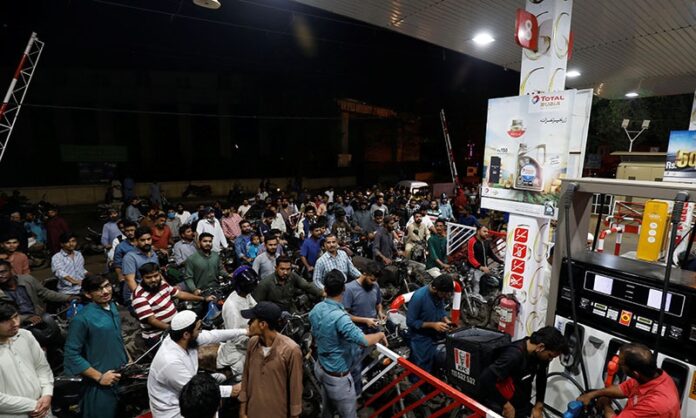For the past three months the federal government has been lying to you. What is worse, they’ve been telling you the same lie over and over again in a futile attempt to calm the nerves of a nation on the brink of complete economic collapse and already in the midst of a full-blown political and constitutional crisis.
The lie in question is that a staff level agreement with the International Monetary Fund (IMF) is just around the corner. Yet with every passing day the government’s mantra of “just a few days” has continued to ring hollow and their actions have become more erratic and difficult to make sense of. Perhaps nothing encapsulates this better than the announcement of a scheme to provide subsidised petrol to low-income families by slashing fuel prices for motorcycles, rickshaws, and cars under 800cc.
Already the IMF has said in so many words that a bailout is not coming until an understanding is reached on the new fuel pricing scheme. Cooked up in closed rooms, presented on lacklustre PowerPoint slides, and forced upon an industry partner with no choice but to comply there is a lot that can go wrong with this plan and very little that can work.
Profit set out to answer some basic questions:
- What exactly are the specifics of the scheme which the government claims will add no added spending burden on its budget?
- Is the basic mathematics behind the concept sound?
- What could possibly go wrong?
- What is the target audience for the scheme and is it worth the risk?
- Why in the world would they do this right now?
The answers have not been encouraging. Representatives of the oil industry have agreed to speak freely only off the record and have been wildly critical. Political opponents have railed against the move and most analysts and opinion-makers have felt the introduction of the scheme is misguided and badly timed. And with the sword of the IMF hanging dangerously close to our heads, how will this play out? The content in this publication is expensive to produce. But unlike other journalistic outfits, business publications have to cover the very organizations that directly give them advertisements. Hence, this large source of revenue, which is the lifeblood of other media houses, is severely compromised on account of Profit’s no-compromise policy when it comes to our reporting. No wonder, Profit has lost multiple ad deals, worth tens of millions of rupees, due to stories that held big businesses to account. Hence, for our work to continue unfettered, it must be supported by discerning readers who know the value of quality business journalism, not just for the economy but for the society as a whole.To read the full article, subscribe and support independent business journalism in Pakistan

























